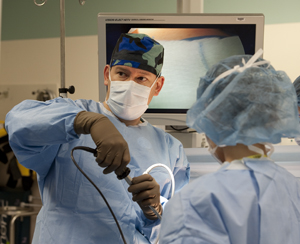
Washington University School of Medicine has partnered with Barnes-Jewish Hospital and St. Louis Children’s Hospital to open the first bariatric surgery program in the area for obese adolescents.
Bariatric surgery reduces the size of the stomach and aids weight loss by limiting the amount of food a person can eat.
“Obese adolescents face a lifetime of long-term health problems related to their weight,” says Washington University bariatric surgeon Esteban Varela, MD, who directs the program. “Bariatric surgery increasingly has become a viable treatment option for extremely obese teens who can’t lose weight by other methods.”
The rate of obesity among teens has more than tripled in the past 30 years. Today, 18 percent are obese, which increases their risk of heart disease, diabetes, stroke and dying young.
Washington University’s adolescent bariatric surgery program is comprehensive in nature. Patients are evaluated by Varela and the adolescent bariatric surgery team, along with pediatric experts at St. Louis Children’s Hospital, including a pediatric endocrinologist and registered dietitian.

Varela
The weight-loss surgery is performed by Washington University surgeons at Barnes-Jewish Hospital, which is designated as a Bariatric Surgery Center of Excellence by the American Society of Bariatric Surgery.
Adolescents ages 15-19 may be eligible for weight-loss surgery if they are extremely obese, with a Body Mass Index above 40. This translates into a weight of more than 280 pounds for a person who is 5 feet 10 inches tall.
Teens interested in the procedure must have been unable to lose weight after participation in the Head to Toe weight management program at St. Louis Children’s Hospital.
Varela and the bariatric surgery team offer three types of minimally invasive weight-loss surgeries: laparoscopic adjustable gastric banding, laparoscopic sleeve gastrectomy and laparoscopic gastric bypass. The surgery generally lasts 1-2 hours and patients often stay in the hospital for 1-2 days afterward. Most patients can return to school or work after two weeks of recovery.
In June, Varela performed the program’s first operation – a laparoscopic gastric banding procedure – on 18-year-old Brittany Lewis, who lives in Illinois. She weighed 298 pounds before her surgery and four months later had lost 60 pounds.
“Brittany is a success story,” Varela says. “She has continued to do extremely well after surgery. She is very motivated, and support from her family has been critical.”
Like adults who undergo weight-loss surgery, adolescents must adopt lifelong changes in lifestyle and diet. This includes eating only three small, healthy meals a day, giving up soda and junk foods and exercising daily for at least 30 minutes.
Bariatric surgery traditionally has been performed only in adults whose obesity caused serious health problems. Until recently, only a few U.S. centers performed weight loss surgery in adolescents – often as part of research studies. But the surgery is becoming more common in obese teens, and new research suggests it is more effective than diet and exercise.
Varela’s own research before he joined the Washington University faculty has shown that bariatric surgery is as safe in adolescents as in adults and that adolescents have fewer complications. In addition, he says, obese teens often are unable to lose weight without surgery.
“A recent study in the New England Journal of Medicine offered very good scientific evidence that obese kids often die young,” Varela says. “An intervention like bariatric surgery has the potential to increase their chances of living longer.”
For more information about the adolescent bariatric surgery program, call (314) 454-8877.
Washington University School of Medicine’s 2,100 employed and volunteer faculty physicians also are the medical staff of Barnes-Jewish and St. Louis Children’s hospitals. The School of Medicine is one of the leading medical research, teaching and patient care institutions in the nation, currently ranked fourth in the nation by U.S. News & World Report. Through its affiliations with Barnes-Jewish and St. Louis Children’s hospitals, the School of Medicine is linked to BJC HealthCare.